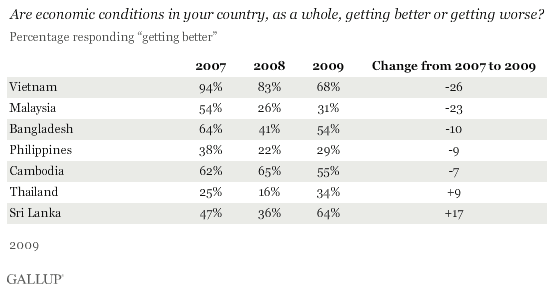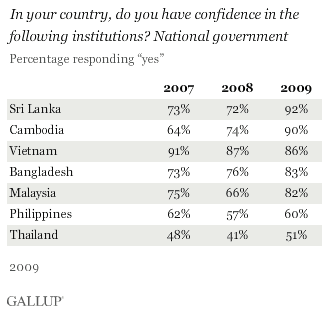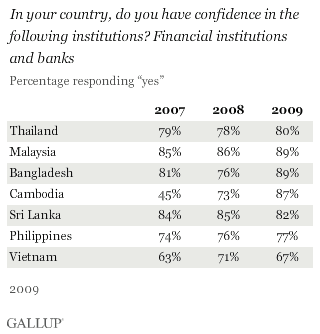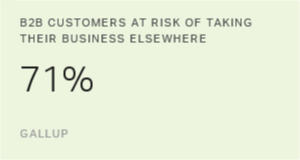PRINCETON, NJ -- Citizens living in developing Asian countries have generally become less positive about the economic conditions in their countries since the onset of the global economic crisis. The drop is especially precipitous in export-heavy countries such as Vietnam and Malaysia where the economy is highly integrated with international markets. For example, in Vietnam, 68% in May 2009 said economic conditions in their country were getting better -- down 26 percentage points from the 94% who said so in 2007 when Asian markets were still vigorous. Views of economic conditions in Malaysia show similar deterioration, dropping 23 points during the same period.

Although the decline is less steep in some other developing countries in Asia where exports are a significant economic driver -- including Bangladesh (down 10 points), the Philippines (9 points), and Cambodia (7 points) -- their citizens, too, are pessimistic about the direction of their respective economies.
Among export-oriented, developing Asian countries for which Gallup has 2009 data, there are two nations -- Thailand and Sri Lanka -- in which the respondents are more optimistic about economic conditions than they were in 2007. Thailand's limited exposure to toxic assets and the introduction of stimulus packages worth $43.4 billion has led the pro-investment Abhisit government to project a positive growth of 2.5% in 2010, a forecast that may be boosting expectations among Thais. It should also be noted that the Thai survey was fielded in October, several months later than the other countries and after the global markets had begun to stabilize. And almost certainly, high levels of positivity in Sri Lanka are more attributable to the end of a 26-year civil war last May than they are to any economic swings.
Yet, unlike the more expected scenario in which poor economic performance is mirrored by lower confidence in national government, the majority of respondents in all seven developing countries continue to exhibit trust in their governing bodies. A significant rebound in confidence is noted in Malaysia and Thailand where trust in national government had reached unusually low levels in 2008.

Strong majorities of Asians in the developing countries surveyed demonstrate similar confidence in their banks and financial institutions. While that confidence has remained stable among populations in most countries, among Cambodians it has nearly doubled in the last two years -- rising from 45% in 2007 to 87% in 2009 -- as the number of banks has increased and many retail operations, such as ATM services, credit cards, and home mortgages, have sprung up.

One explanation for the disconnect between a faltering economy and citizens' continued high levels of confidence in their governments and banks is that, unlike the 1997 Asian financial crisis where citizens blamed their national government and financial sector for causing the problems, this global crisis is likely seen as having its origins in the U.S. and Europe where consumer demand for Asian exports has plummeted.
For complete data sets or custom research from the more than 150 countries Gallup continually surveys, please contact worldpollpartners@gallup.com or call 202.715.3030.
Survey Methods
Results are based on face-to-face interviews with 1,000 adults, aged 15 and older, conducted in May-August 2007, February-September 2008, and April-October 2009 in Bangladesh, Cambodia, Malaysia, Philippines, Sri Lanka, Thailand, and Vietnam. For results based on the total sample of national adults, one can say with 95% confidence that the maximum margin of sampling error ranges between ±3.0 and ±4.4 percentage points. The margin of error reflects the influence of data weighting. In addition to sampling error, question wording and practical difficulties in conducting surveys can introduce error or bias into the findings of public opinion polls.
